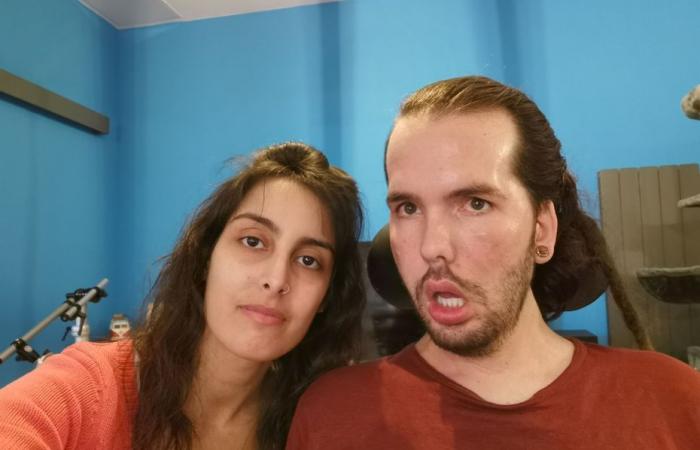Written by Emilie Barthe
share this article:
Suffering from Charcot's disease, Emilien will no longer have access to the experimental drug that makes his life still sustainable. A decision from the High Authority of Health. Accompanied by his wife Adeline, this resident of Sens (Yonne) continues to fight to reverse the situation.
Company
From daily life to major issues, discover the subjects that make up local society, such as justice, education, health and family.
France Télévisions uses your email address to send you the “Society” newsletter. You can unsubscribe at any time via the link at the bottom of this newsletter. Our privacy policy
“There is anger and worry”. These words are those of Emilien, pronounced using his digital tablet, upon the announcement of the decision of the High Authority of Health (HAS) to prohibit his treatment.
The 35-year-old young man, originally from Sens in Yonne, has been fighting Charcot disease (Amyotrophic Lateral Sclerosis, ALS) for 4 years. This neurodegenerative disease causes progressive muscle paralysis.
“We’re leaving like in 2020, with death on our minds”
This Thursday, October 10, 2024, Emilien and his wife still remember it. “We’re leaving like in 2020, with death on our minds”says Adeline, his wife, thinking back to the announcement of the ax. That day, the young Icaunaise discovered the sad news when receiving the newsletter from the association for research on ALS (ARSLA).
And she finds it hard to believe it. Once the information is recorded, she thinks back to her husband's next hospitalization, in early November. Will it take place? Is this the last?
She knows that these moments are crucial for her husband. They allow him to receive an injection of Qalsody, a medication allowing him to slow down or even stabilize the progression of his illness.
A gradual loss of control over one's body
Since his illness was diagnosed in October 2020, Emilien gradually lost the use of his arms, legs and speech. “At the beginning, he could still talk. His legs were dysfunctional, so he walked with crutches or a walker”explains his companion. “The neurologist explained to us that it would deteriorate quickly”she adds, aware of the rapid progression of the disease.
Emilien and his partner Adeline.
•
© Adeline, wife of Emilien.
The young woman explains that Emilien saw his condition worsen between the evening when he went to bed and the morning when he got up. “He felt that his limbs were moving less”underlines Adeline, who no longer recognized her husband. “I saw him become a ghost, a shadow of himself. As if it was someone else”adds the young woman, having to face her husband's speeches suggesting that she start a new life.
The thirty-year-old had even taken steps to be euthanized in Belgium. “I knew it was his fear to be imprisoned in a body with a brain that had all his faculties”underlines Adeline, alongside her husband at all costs.
“We were starting to have an almost normal life”
The couple didn't need to come to this. A few weeks after the announcement of the diagnosis, the neurologist suggested that they join a study, and very quickly the positive effects were felt. “The neurologist saved my husband’s life”expresses full of gratitude Adeline.
From the first injections of tofersen (a molecule present in the medication), Emilien feels one of his hands soften and is able to lift his left leg again. “The doctors couldn’t explain how this was possible”remembers his wife, even though we had explained to her the irreversible effects of the damage caused to her legs.
We told ourselves that he could see his daughter grow up, see her learn to read, to ride a bike… we all went on outings together. He is able to accompany her to school.
AdelineWife of Emilien, suffering from Charcot's disease
Her husband adds: “we were starting to have an almost normal life”. The thirty-year-old even manages to communicate with his daughter, using a visually controlled tablet. Infrared sensors allow him to select letters on a keyboard and make a word, then a sentence, like texting but with his eyes.
Having lost the use of speech, Adrien communicates using a visual recognition tablet.
•
© Adeline, wife of Emilien.
“In almost two years, we have had almost no new problems”supports his wife who does not understand the HAS decision. “With the results, we don’t understand”supports Emilien, determined to fight this fight for all people affected by this disease.
The couple, accompanied by ARSLA, opened an online petition which has already collected more than 50,000 signatures in order to push the HAS to review its decision. They were able to observe a first victory with the postponement of the definitive ban from November 4 to 20. Enough to give Emilien time to get a new injection. But the struggle continues.
“We wrote to Emmanuel Macron, to several parliamentary groups, to newspapers… the idea is to make ourselves visible and show that the treatment works because Emilien is proof of it.
AdelineWife of Emilien Hurié, suffering from Charcot's disease
“Otherwise, that would mean that the laboratory, the doctors, the researchers invested for nothing”adds the young woman, annoyed that an operational treatment exists but that her husband and all the people suffering from the disease are deprived of it.
“I am available to meet the authorities and show them the results”concludes Emilien. With the support of their family, friends, and members of ARSLA, the couple hopes to win their case.






